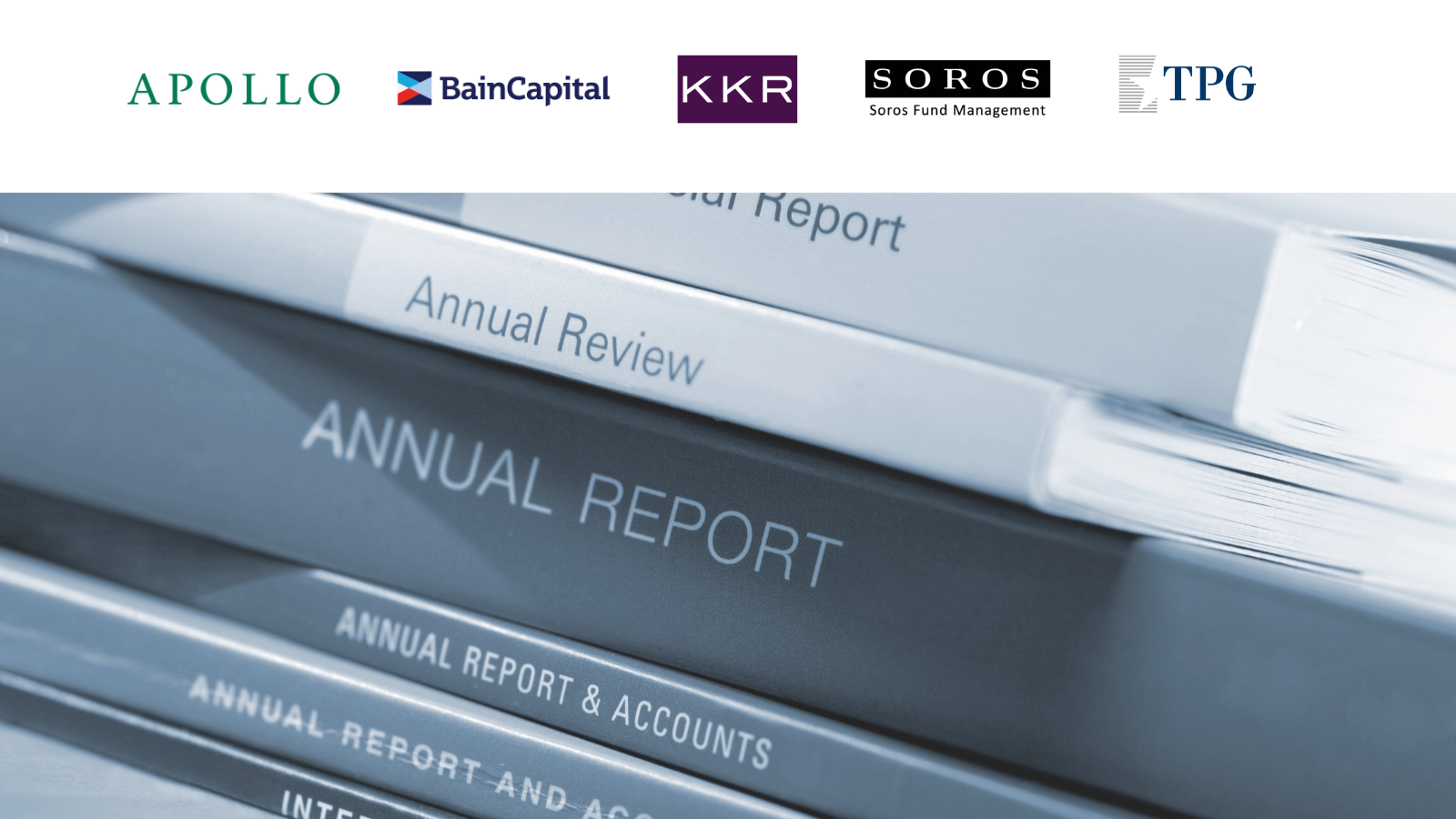ImpactAlpha, July 26 – A billion-dollar impact fund used to be an industry milestone. Now $1 billion is table stakes for legacy private equity firms moving into impact, sustainability and climate action (see, for example, KKR, TPG, General Atlantic, BlackRock and Ariel Alternatives), and fund sizes have climbed as high as $15 billion (Brookfield).
Impact reporting has likewise come of age. Once a practice primarily of nonprofits, the biggest private equity firms in the world now publish fund-specific and sometimes company-wide impact reports, and even slip impact reporting into their broader annual report.
We pored over hundreds of pages (so you don’t have to) from TPG, Bain Capital, KKR, Apollo and Soros Fund Management to cull social and climate-related outcomes. One metric that caught our attention: impact yield.
Does your fund report its impact? Shoot a note, and your report, to [email protected].
Bain Capital Double Impact: Taking mission-driven companies to scale
Bain Capital was an early mover into impact investing for large private equity firms: former Massachusetts Gov. Deval Patrick helped launch Bain Capital’s impact group, Bain Capital Double Impact, in 2015 (get the backstory, “What we know about Bain Capital’s $390 million Double Impact Fund“).
Since then, the size of its two funds have been dwarfed by multi billion-dollar sustainable funds from big-name private equity peers. A key reason: Bain Capital Double Impact isn’t focused on big green infrastructure investments or climate tech. Instead, the firm has kept its focus on modest eight-figure deals in healthcare, education and workforce development, as well as smaller environmental sustainability-focused companies.
- Diversity emphasis. “We believe inclusive organizations deliver better results,” the group wrote in its latest impact report. “We believe that driving change starts at the top.” Of the groups own 26 team members, more than half of senior leadership, and 92% of other staff, come from underrepresented groups. Forty-three percent of management positions at Double Impact’s portfolio companies are held by women, people of color, veterans, LGBTQ+ and others from underrepresented backgrounds.
- Investing in health. Bain Capital Double Impact invests in order to help companies scale up, either with new products and services or by entering new markets. In the US healthcare sector, its investment in ConvenientMD is addressing a shortage of primary care physicians by helping urgent care patients access permanent primary care services. The service, Double Impact states, also helps shift urgent care from a money-centric fee-based service to a more patient-centric value-based service.
- Portfolio additions. Since 2015, Double Impact has raised two funds of $800 million and $390 million, made 24 investments and notched four exits – and had a hiccup or two. Its four new investments in 2022 include. Athena Health, which is helping small and mid-sized healthcare practices go digital. Meteor Education is helping schools create classrooms and other spaces that are more conducive to learning. Basic Home Infusion offers home services to health patients using IVs and infusion pumps. Freewill offers estate planning so individuals can designate donations to nonprofit organizations.
KKR: Cutting employees in on ownership
With over $500 billion in assets under management, private equity giant KKR remains focused on honing its sustainability-lens to drive long-term value creation in “how and where we invest, how we support companies, and how we operate as a business,”co-CEOs Scott Nuttall and Joseph Bae write in KKR’s latest sustainability report.
“Sustainability will continue to be a central part of our growth strategy,” said Bae and Nuttall. KKR’s priorities this year include expanding employee engagement and ownership efforts through its KKR Global Impact platform, which includes a pair of funds that have raised a total $3.2 billion. KKR has closed at least $1.9 billion for its second global impact fund.
“We have found that supporting the implementation of robust employee engagement and ownership programs can create a more productive workforce, increase employee retention, and enhance operational excellence,” says KKR Global Impact’s Ken Mehlman.
KKR says it is also keeping an eye out for energy transition, supply chain resiliency, digitalization and other impact-focused investment opportunities. The private equity investor has made several key hires this year, including Emmanuel Lagarrige and Charlie Gailliot to co-lead a new climate fund (see, “Private equity giants double down on the low-carbon transition and impact investing”).
- Ownership economy. KKR, under the leadership of Pete Stavros, helped launch Ownership Works and enlisted TPG, Apollo and dozens of other private equity investors to pledge to give equity shares to employees at some portfolio firms with the goal of creating $20 billion in wealth for low- and moderate-income workers over the next decade. KKR itself last year sold C.H.I. Overhead Doors to steel company Nucor Corp. for $3 billion. The company’s 800 workers received average cash payouts of $175,000 (albeit a small percentage of KKR’s 10x return on its investment in C.H.I.) The private equity firm also completed the sale of Minnesota Rubber & Plastics to Trelleborg Group. Employees received cash payouts as part of the employee-ownership program KKR implemented when it acquired the materials science company in 2018.
- Energy transition. KKR has long been an active investor in renewable energy, via its infrastructure and credit strategies, investing more than $15 billion in renewable energy since 2011. The firm acknowledges it also invests in “conventional” energy companies and helps them transition to renewables. Last year, KKR led a structured financing deal for US-based solar and wind developer Arevia Power. It also invested $400 million in New Delhi-based Serentica Renewables, which provides low-carbon clean power for energy-intensive and hard-to-abate industrial customers in India.
“Energy intensive, heavy-industry companies play an important role in society but have traditionally faced more challenges in meeting energy needs sustainably,” KKR’s Hardik Shah wrote in the report. With an additional $250 million from KKR earlier this year, Serentica plans to install 5,000 MW of carbon-free generation capacity and storage in India. Last year, KKR also backed New Delhi-based independent power Hero Future Energies to expand into battery storage and green hydrogen and enter new markets.
Soros Fund Management: Finding data and deals elusive for expanded focus on climate
Like many billionaires, George Soros has become increasingly alarmed about unchecked global warming. Earlier this year, he drew attention for his support for a geoengineering plan to help cool the Arctic by enhancing cloud cover.
It is more prosaic emissions reduction and measurement that concerns Soros Fund Management, the $25 billion asset manager for Soros’ Open Society Foundation and family office. Soros recently ceded control of OSF to his son, Alex.
Soros Fund Management launched its climate action strategy in 2020. The four-pronged strategy aims to zero out direct and indirect emissions across the fund’s portfolio by 2040, restrict fossil fuel exposure, engage companies on climate action, and invest in climate solutions.
The firm’s second climate action progress report outlines headway on that plan as well as challenges it is grappling with. “We believe sustainability initiatives create different degrees of value for companies and companies will have different effects on people and the planet. Combining these all into a single score or rating fails to capture this nuance and can be misleading,” says the firm. “Our impact strategy is designed to avoid common pitfalls of ESG integration and achieve real economy impact.”
- Carbon visibility. SFM says it spent much of 2022 working to increase the visibility of emissions across its portfolio. One challenge: obtaining accurate data for asset classes such as private equity and debt. Most private companies do not report on their annual emissions, so Soros estimates their discharges using comparable data from public companies.
In 2022, the asset manager began covering emissions data for third party hedge funds, and plans to add structured credit, ETFs and real estate. It says tracked greenhouse gas emissions were cut by more than 50% from a 2019 baseline. Soros’ portfolio managers use an internally developed tool to monitor the emissions intensity of their portfolio and analyze how a particular investment or divestment would affect that.
- Climate solutions. From carbon capture to greening heavy industry to nature-based solutions, innovative climate solutions are seemingly everywhere. SFM says that high valuations for many private market investments lowered its deal activity. It evaluated “a high volume” of climate solutions, but says “few met our bar for climate impact and prudent investing.” Also weighing on its climate portfolio: investees that went public only to see their values decline (SFM cut its stakes in EV makers Tesla and Rivian earlier this year).
The market value of its climate solutions investments, as of the end of 2022, was nearly $1 billion in private companies and $321 million in public ones. “We continue to explore investments that support the energy transition and look for opportunities to drive resource efficiency, as well as sustainable food and water supply,” the firm says.
TPG: Calculating the impact multiple of money
Remember Bono? Or Bill McGlashan? Blink and you may have missed that TPG has now brought to market three Rise funds, its franchise of impact-focused private equity funds, as well as a $7.3 billion climate fund. On its May earnings call, TPG reported it had raised $2.2 billion of a $3 billion goal for Rise III.
The four funds, along with Evercare, the emerging-markets health fund TPG acquired from Abraaj, make up TPG’s Impact Platform, a strategy that’s accumulated $15 billion under management and a portfolio of more than 55 companies with operations in more than 65 countries. The funds map their investments to 17 U.N. Sustainable Development Goals.
In 2022, TPG generated exits from Rise I (incl. EverFi and Dodla Dairy), invested $200 million in six companies from Rise II (Tata Motors, Beta Technologies), and made its first seven investments from Rise III (Intersect Power, Rubicon Carbon), according to its latest impact report.
TPG claims $9 billion in “quantified impact” across its funds, or the economic value of the social impact associated with the business outputs of its portfolio companies. Here’s a metric most traditional private funds don’t report: The “impact yield” of Rise I, TPG’s $2.1 billion inaugural impact fund, was up 113% last year.
(When the firm launched Rise I, TPG’s “Impact Multiple of Money” became a flashpoint of the impact management debate for claims it could put a dollar value on impact.)
More specifically, the portfolio has surpassed 100 million “student touchpoints” with quality education, almost 40 million low-income households adopting responsible financial services and wellness programs, and more than 2.5 million health interventions. On the climate side, Rise investments have helped avert more than 100 million metric tons of carbon and saved over 28 million cubic meters of water.
“The broader sector has been buffeted by skepticism against the premise that you can do good while doing well,” writes the Rise team in the report’s introduction. “This growing headwind underscores the importance of our focus on building the case for impact investing one company at a time.”
Apollo Global Management: Doubling down on sustainability goals – for tomorrow
Apollo Global Management’s 2022 sustainability report reads like a letter from an earlier era. Unlike some other financial services companies (looking at you, BlackRock), the $548 billion asset manager and private equity investor remains an unabashed champion of ESG, impact and diversity, equity and inclusion practices. But like many sustainability reports from earlier years, much of Apollo’s impact remains aspirational or a work in progress.
Apollo’s Sustainable Investment Platform deployed $6 billion last year in climate and clean energy capital, toward a goal of $50 billion by 2027. The firm will have to ramp up annual deployments even further to meet its new goal of providing $100 billion in climate capital by 2030. Apollo counts its $175 million commitment to Summit Ridge, a community solar developer and operator, as well as carbon-removal strategies from CarbonCure and Charm Industrial. It also counts its stake in Energos, a liquified natural gas supplier, which it says is helping displace dirtier fuels such as coal and diesel.
Apollo reports that its portfolio companies have met the firm’s goal of spending $1 billion with diverse suppliers; the new goal is $2 billion per year. But it said it has not yet achieved its portfolio carbon reduction goals of 15% over the period it holds its investments.
The company has committed more than $1 billion to partnerships with diverse-led asset management, including Lafayette Square, Brightwood Capital Partners and HarbourView Equity Partners. New relationships include Siebert Williams Shank and Advent Capital. Apollo itself hired 700 people in the U.S. last year and almost half (49%) were women. More than 30% were “ethnically diverse,” the firm said. Apollo is a partner in AltFinance to create finance career pathways for students at historically Black colleges and universities and gets good marks from outside observers for its internal recruitment and retention efforts.
The Apollo Impact Platform, under co-heads Marc Becker and Johanna Reis, has made four investments. That platform has reported under the Operating Principles for Impact Management for its $924 million in assets (for background see, “Private equity giant Apollo Global invites agents of impact inside”).
To ensure the firm’s sustainability efforts receive high-level attention, Apollo last year created a board-level Sustainability and Corporate Responsibility committee, led by Kerry Murphy Healey, former president of Babson College and former lieutenant governor of Massachusetts. Apollo executives say the firm has not changed its tune in the face of the backlash to ESG investing, particularly in some Republican-led U.S. states.
“The new attention is not changing the way we do business,” co-president Scott Kleinman says in an interview included in the report. “But the conversation is helping us to be more precise in how we define what is driving the decisions we make and how we drive value for our clients.”











